Activists cling to hope Myanmar leader will step up and fight ethnic cleansing
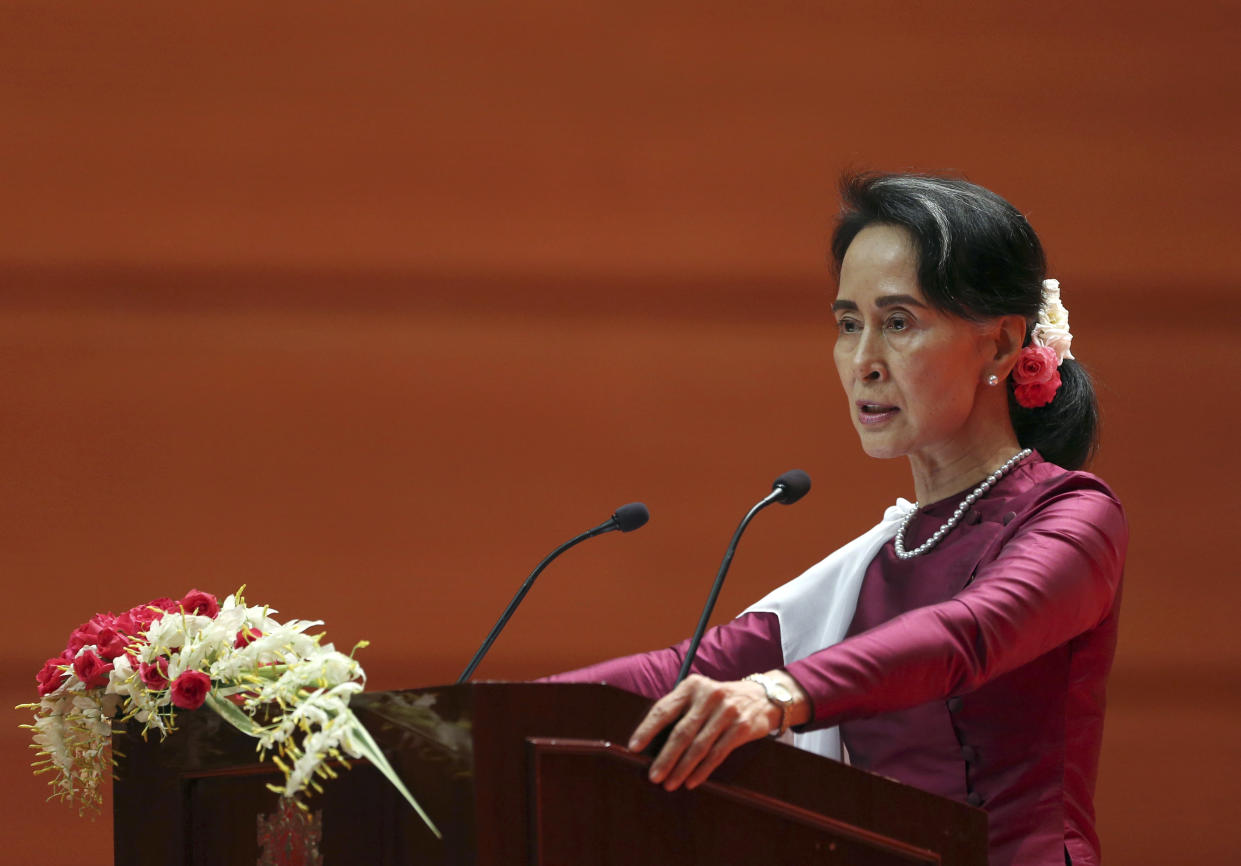
Last week Myanmar’s de facto head of state Aung San Suu Kyi again failed to address the international communities’ concerns on the plight of the displaced Rohingya ethnic group in her country. The onetime democratic activist and Nobel Peace Prize laureate seemed unaware or unwilling to acknowledge the mass exodus of the Muslim minority in the mostly Buddhist country, leading human rights officials to debate their next step in the unfolding tragedy.
In one month, more than 422,000 Rohingya have been forced to flee their home in the country’s northern Rakhine State as the Myanmar military reportedly conducts “clearance operations” that have been deemed “a textbook example of ethnic cleansing” by the United Nations human rights chief Zeid Ra‘ad Al Hussein.
Rights groups have been pressuring diplomats to redirect their attention and issue targeted economic sanctions against the leaders of the campaign and the country’s true power, the military.
After decades of martial law, Suu Kyi’s party National League for Democracy (NLD) took control of the government in 2016 as the face of Myanmar’s long-delayed shift to democracy. But since then, she has been a “profound disappointment,” says Human Right’s Watch Asia advocacy director John Sifton, for failing to condemn the same army generals who kept her under house arrest for 15 years.
Still, he says, she may be the international communities’ only hope to halt the continuing atrocities.
Although Suu Kyi rightfully won Myanmar’s election, her formal title is state counsellor, a position she created for herself to get around the constitution’s prohibition on anyone with a foreign spouse or children from holding the presidency. Suu Kyi’s two children are British citizens, as was her late husband.
Still, she is widely recognized as the country’s leader, with the president, U Htin Kyaw, serving as a close confidant. But the Constitution allots 25 percent of parliamentary seats to the military and allows the armed forces to overrule the president in the event a “state of emergency arises” or any time the army deems newly established rights are interfering with their ability to protect the state’s sovereignty.
“They realized they could manage a transition to ‘democracy’ in which she would run a civilian government, but they would continue to essentially run the national security and foreign affairs of the state,” says Sifton.
The Myanmar Army began its most recent crackdown on the Rohingya a month ago, after a handful of insurgents under the name Arakan Rohingya Salvation Army (ARSA) attacked police outposts, killing 12 officers. The army has since used the attack as a pretense to systematically kill civilians, rape women and burn more than 200 villages. Military leaders say the campaign is targeting only armed militants, even as close to half the Rohingya population in Myanmar has now fled to neighboring Bangladesh.
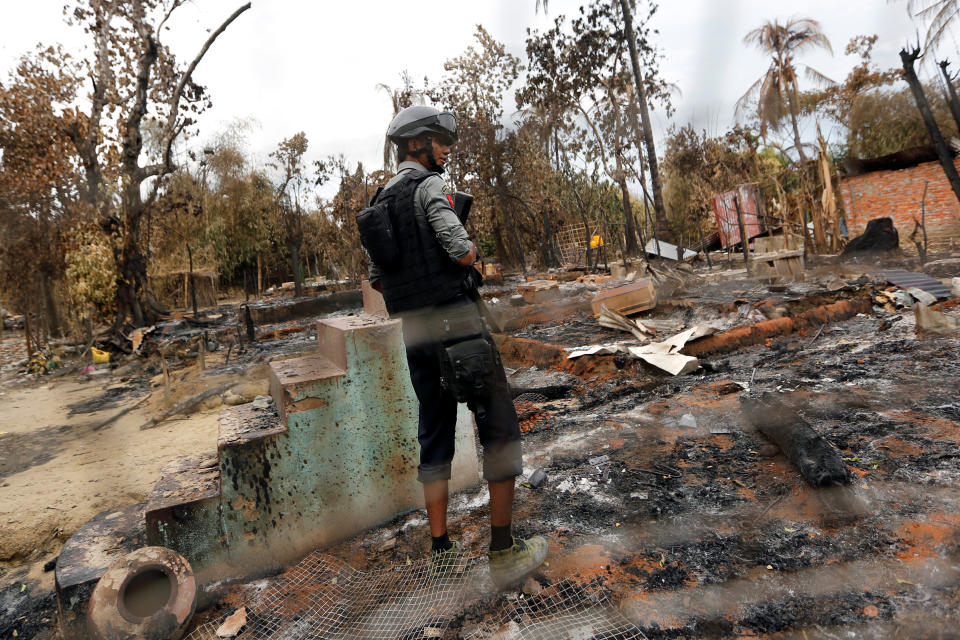
Slideshow: Rohingya flee to Bangladesh after Myanmar attacks >>>
Dan Sullivan, senior advocate for human rights at Refugees International, who visited Cox’s Bazar, Bangladesh, close to the border, says Bangladeshi patrols described finding land mines at crossing points and verified refugees’ stories that it was Myanmar police setting fire to their homes.
Also near Cox’s Bazar, United Nations Human Refugee Agency spokeswoman Kitty McKinsey, who is working in two nearby refugee camps, says although they heard the raids had slowed slightly, refugees are still coming over the border. McKinsey says they have all told similar stories.
“They describe seeing their families killed, chopped up in front of them, this is the thing I hear over and over again,” she says.
But the persecution of Rohingya in Myanmar is not unique to the military and has roots extending back more than half a century. Among the Burmese population, even the name ‘Rohingya’ is taboo, as many believe the government narrative that these people are illegal immigrants from Bangladesh. Under Myanmar’s 1982 Citizenship Law, Rohingya are not one of the recognized “national races” and therefore are denied basic rights.
Human Rights Watch deputy director for global advocacy Philippe Bolopion visited Rakhine State in the spring, when he says even before the recent crisis, many Rohingya were confined to “de facto prison camps” without access to jobs, hospitals or education.
“People are stuck in these camps for years, they have absolutely no future, and no dignity and no semblance of a normal life.”
McKinsey says the minority group is unique in that they are one of the only ethnic populations in the world that are both stateless and refugees.
“These people have never had the protection of the country in which they were born. The Rohingya are the most friendless people in the world, the most persecuted people in the world. … They have no allies, it’s just unbelievable.”
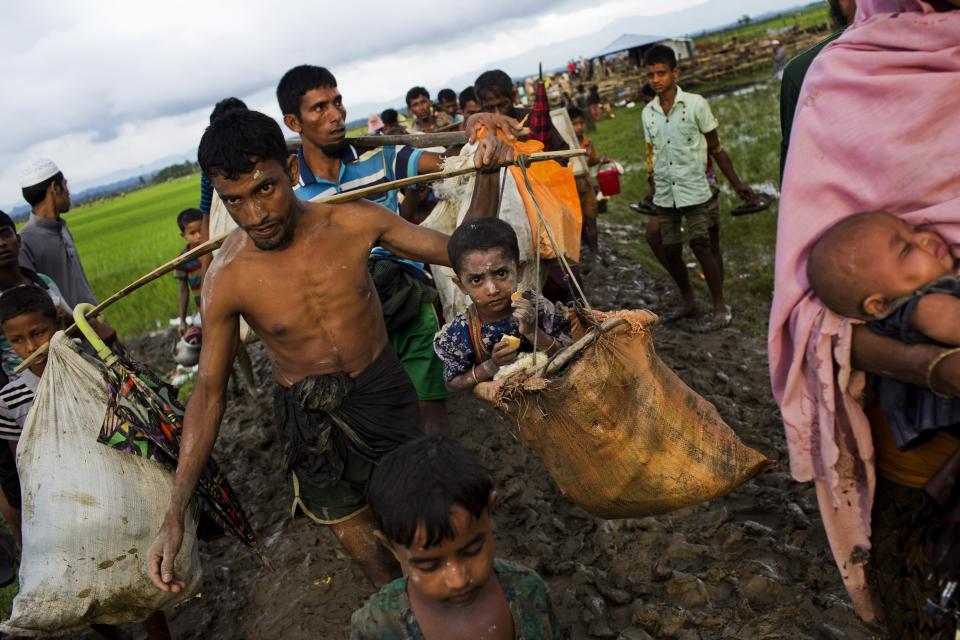
After the most recent wave of refugees, Bangladesh, one of the poorest countries in the world, is now sheltering more than 800,000 Rohingya. Local Bengalis have begun to open their homes to refugees as well as to those already living in camps, but McKinsey says the speed and sheer number of arrivals have left at least 90 percent of the latest wave living outside of the camps, forced to squat in makeshift shelters on the side of the road.
Last week’s U.N. General Assembly brought together more than 100 heads of state but failed to produce any kind of concrete action on the crisis. The U.S. also pledged $32 million for the emergency response in Bangladesh and in Rakhine State itself. But as a political matter, Sifton says there is reluctance among U.S. officials to admit that their hopes for Myanmar haven’t been realized. Under President Obama the U.S. removed most sanctions on Myanmar in 2016 and began working and training with the country’s military in a limited capacity.
“Policy makers the world over who were invested in [Myanmar’s] transition are concerned that taking tough actions like sanctions, arms embargos will essentially be an admission that the transition to democracy has failed,” he says.
The State Department refused to comment on sanctions. In spite of a long history of ethnic conflict and atrocities under years of unfettered military rule, the U.N. has never issued sanctions on Myanmar for its human rights abuses. However, many countries have taken a bilateral approach to punish the state.
The U.N. has yet to even hold a public Security Council meeting on the situation in Rakhine State, but Sifton says the issue has the necessary support for a procedural vote to put the issue on the agenda. Sanctions or other substantive action would likely be vetoed by China, one of Myanmar’s closest allies, but Sifton thinks even debating the issue would send a signal to the military that they are under scrutiny.
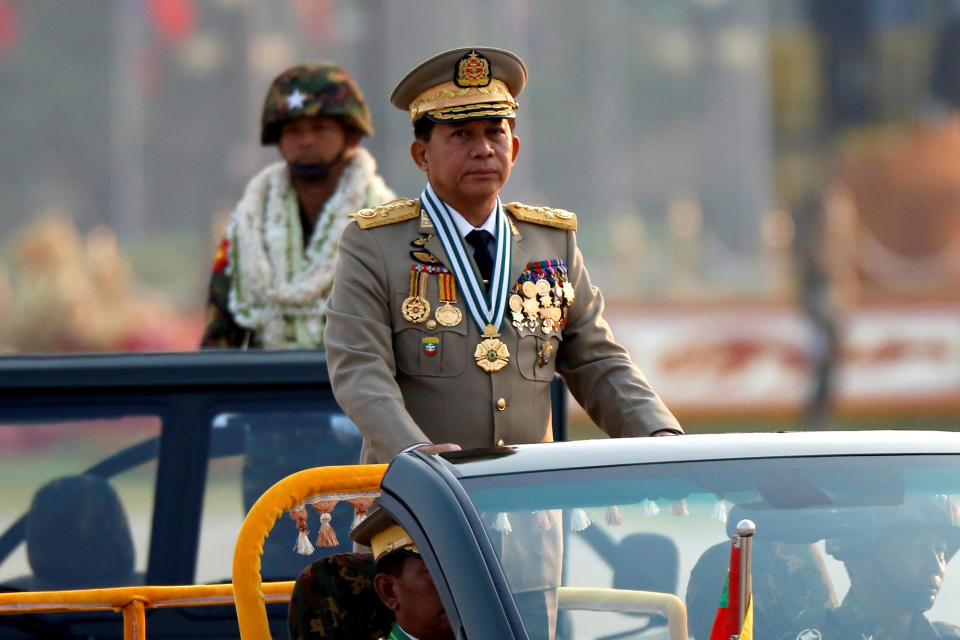
However, recent military speeches in the region call into question whether such a threat would be much of a deterrent. On Thursday, Gen. Min Aung Hlaing addressed the situation in Rakhine State without mentioning the almost half million Rohingya Muslims who fled his forces.
“Regarding the rehabilitation of villages of our national races, for the national races who fled their homes, first of all they must go back to their places,” he said.
The use of ‘national races’ refers to the constitutionally recognized ethnic groups, including both Buddhists and Hindus, some 30,000 of whom have also been displaced by the crisis.
Related slideshow: Protesters rally in solidarity with Rohingya Muslims >>>
Aung Hlaing has done little to hide that his army is trying to rid the country of Muslims entirely, defending the operations as “unfinished business,” a reference dating back to World War II when ethnic tensions between Buddhist and Muslims resulted in mass atrocities, disproportionately affecting the Rohingya.
Former Lt. Gen. Wai Lwin also spoke Thursday during a rally for the former ruling Union Solidarity and Development Party, where he and others spun theories of the Rohingya’s ties to militant groups like the Islamic State and dismissed international pressure to halt the clearance operations. Wai Lwin stressed the importance of the military’s ability to “protect the country’s sovereignty,” over “prioritizing human rights.”
Even with the army’s transparent intentions on public display, Suu Kyi has refused to condemn the military, reminding the world that her government has only been in power for 18 months.
“I’m a bit dumbfounded by this idea that we have to be understanding of the hardships of democratic transition. Yes, we get that, but that does not excuse an ethnic cleansing campaign,” says Bolopion.
Rights groups have called for sanctions specifically targeting high-ranking military officers, issuing personal travel bans and targeting companies they own.
“The Trump administration could throw [Myanmar’s army chief] Gen. Min Aung Hlaing on the specially designated nationals list tonight if he wanted to.”
This list, issued by the Treasury Department, designates individuals and companies that are effectively blacklisted, cutting off their assets and any relations with the U.S. The decision would not require billions of dollars or even international cooperation, it’s just a matter of policy.
Senior U.S. officials have expressed fear that sanctions will only strengthen the military and serve to further isolate Suu Kyi. But Human Rights Watch believes these actions would do just the opposite, he says, empowering Suu Kyi and leveraging her record of getting Obama to lift sanctions to rein in the army.
From the beginning of her appearance in the world’s spotlight, Suu Kyi has said she’d like to be seen as a politician, not a human rights icon, and Human Rights Watch’s calls for action suggests using her as such.
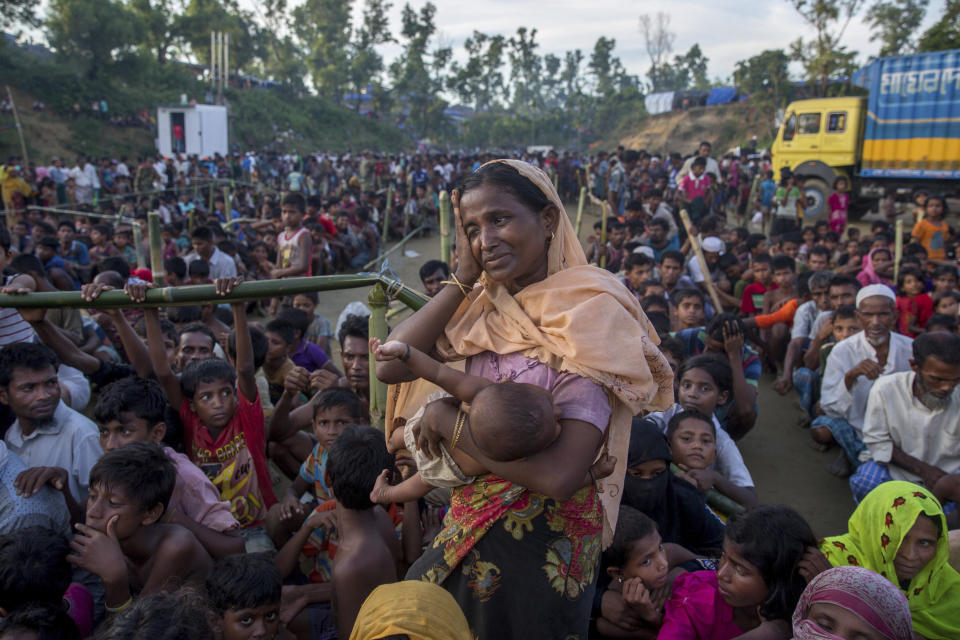
“She could be the middle man between the generals and the U.S. She’ll be the one to convince them [that] if they do what she asks, which is stop these operations and negotiate some kind of situation where [refugees] are allowed to return,” she could get sanctions removed again, says Sifton.
Unfortunately, even if the Rohingya are able to return, prejudice runs deep among the people of Rakhine State. The end of strict military rule gave rise to a growing strain of Buddhist extremism that regards the Rohingya a threat to both the country and its majority religion.
“We’d have a situation where we’d basically be asking the people who are carrying out the ethnic cleansing to stop carrying out the ethnic cleansing, let people return and then guard them from ethnic cleansing by the local population,” says Sifton.
In these types of situations, peacekeeping forces or international monitors are often deployed, but often come with their own set of problems.
Despite perilous conditions, McKinsey says, all refugees — including the Rohingya she’s spoken with — always want to return home.
“These are people with their own free will and they are the ones who will decide where they can go safely. … The international community to needs to create conditions that will make it attractive for people to go back to their lives,” Bolopion adds.
_____
Read more from Yahoo News:



